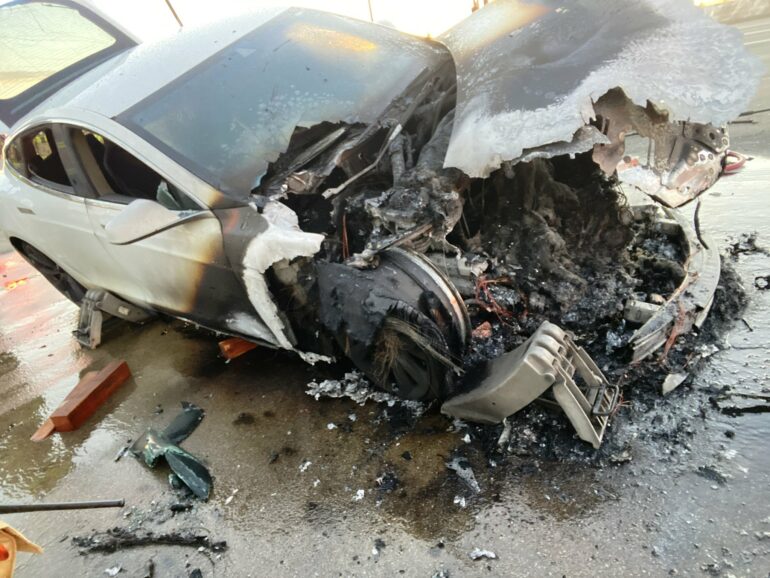It’s been quite a few bad months for Tesla. Elon Musk has been focused on his recent acquisition of Twitter, the carmaker has found itself in court over its autopilot feature, its stock plunged and then jumped, and now a Tesla Model S has spontaneously caught on fire on a highway in California.
“Firefighters used 6,000 gallons of water to extinguish a Tesla Model S that spontaneously burst into flames on a busy highway outside of Sacramento on Saturday,” The Guardian reported.
“The driver, who was not injured, was on Highway 50 in Rancho Cordova at around 3pm when smoke started to come out from the front of the car.
Firefighters used 6,000 gallons of water to extinguish a Tesla Model S that spontaneously burst into flames on a busy highway outside of Sacramento on Saturday.
Officials responded to the scene with two fire engines and a water tender. The Metro Fire of Sacramento crew said that nothing was previously wrong with car.”
The EV company’s stock also recently got pinged by JP Morgan analyst Ryan Brinkman as having risen much too quickly. He pointed to the several uncertainties about Tesla’s future to warrant such a jump.
“Tesla’s softer trend and below-consensus adjusted automotive gross margin comes before the impact of large price reductions that will primarily be felt beginning in the first quarter,” Brinkman said in a new client note. “As such, we view margin trajectory negatively and expect that consensus margin expectations are likely to decline,” according to Yahoo Finance.
Although both technology and execution risk seem substantially less than was once feared, expansion into higher volume segments with lower price points seems fraught with greater risk relative to demand, execution, and competition,” Brinkman added. “Meanwhile, valuation appears to be pricing in upside related to expansion into mass-market segments well beyond our volume forecasts for the Model 3.”
The bearish note on Tesla comes after the company reported a mixed — at best — fourth-quarter and full-year outlook last week.
Tesla’s fourth-quarter gross profit margin came in at 23.8%, short of estimates of 25.4%. The automotive gross profit margin clocked in at 25.9%, compared to analyst estimates of 28.4%.
This past summer, Tesla cut a large portion of its workforce as Musk said he was preparing for an “economic hurricane.”
The EV carmaker also faced intense scrutiny from vehicle owners after it dramatically cut prices “across its U.S. lineup this month”, which led to “a backlash from customers, many of whom paid thousands of dollars more for their vehicles just weeks earlier, noted The Wall Street Journal.
Tesla Chief Executive Elon Musk said demand has surged following the price reductions, which executives said were aimed at making Teslas more affordable and qualifying some models for a federal electric-vehicle tax credit.
The operator of one Tesla-focused YouTube channel organized a petition asking that customers who purchased cars before the lower prices took effect get free or discounted software downloads. It has received more than 6,000 signatures.
Such a groundswell of customer angst about a price cut is uncommon in the auto industry, where car companies frequently discount models to stimulate sales—albeit in a more selective way. Tyson Jominy, vice president of data and analytics at research firm J.D. Power, said he has never seen an automaker make such an immediate, deep cut across multiple models.”
To make matters worse for Musk, the EV wars are heating up. Ford jumped into the price battle. The Michigan car company, reported The New York Times, said it “was cutting prices on its top-selling battery-powered model, the Mustang Mach-E, and increasing production of the sport utility vehicle. It was the latest sign of intensifying competition in the electric car market.
Two weeks ago, Tesla slashed prices of its electric cars by as much as 20 percent in response to softening demand around the world.
The price cuts for the two most affordable versions of the Mach-E amounted to less than $1,000 each. Other models, with longer-range batteries and premium options, were reduced $3,680 to $5,900, reductions of 6 percent to 9 percent.
“We want to make E.V.s more accessible, so we’re increasing production and reducing prices across the Mach-E lineup,” Ford’s chief executive, Jim Farley, said on Twitter. He added that “with higher production, we’re reducing costs, which allows us to share these savings with customers.”
[Read More: Bad Signs As This Key Indicator Stars Flashing A Warning]


